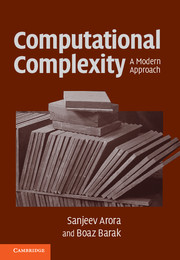Book contents
- Frontmatter
- Contents
- About this book
- Acknowledgments
- Introduction
- 0 Notational conventions
- PART ONE BASIC COMPLEXITY CLASSES
- 1 The computational model – and why it doesn't matter
- 2 NP and NP completeness
- 3 Diagonalization
- 4 Space complexity
- 5 The polynomial hierarchy and alternations
- 6 Boolean circuits
- 7 Randomized computation
- 8 Interactive proofs
- 9 Cryptography
- 10 Quantum computation
- 11 PCP theorem and hardness of approximation: An introduction
- PART TWO LOWER BOUNDS FOR CONCRETE COMPUTATIONAL MODELS
- PART THREE ADVANCED TOPICS
- Appendix: Mathematical background
- Hints and selected exercises
- Main theorems and definitions
- Bibliography
- Index
- Complexity class index
9 - Cryptography
from PART ONE - BASIC COMPLEXITY CLASSES
Published online by Cambridge University Press: 05 June 2012
- Frontmatter
- Contents
- About this book
- Acknowledgments
- Introduction
- 0 Notational conventions
- PART ONE BASIC COMPLEXITY CLASSES
- 1 The computational model – and why it doesn't matter
- 2 NP and NP completeness
- 3 Diagonalization
- 4 Space complexity
- 5 The polynomial hierarchy and alternations
- 6 Boolean circuits
- 7 Randomized computation
- 8 Interactive proofs
- 9 Cryptography
- 10 Quantum computation
- 11 PCP theorem and hardness of approximation: An introduction
- PART TWO LOWER BOUNDS FOR CONCRETE COMPUTATIONAL MODELS
- PART THREE ADVANCED TOPICS
- Appendix: Mathematical background
- Hints and selected exercises
- Main theorems and definitions
- Bibliography
- Index
- Complexity class index
Summary
Human ingenuity cannot concoct a cipher which human ingenuity cannot resolve.
– E. A. Poe, 1841In designing a good cipher … it is not enough merely to be sure none of the standard methods of cryptanalysis work–we must be sure that no method whatever will break the system easily. This, in fact, has been the weakness of many systems. … The problem of good cipher design is essentially one of finding difficult problems, subject to certain other conditions. This is a rather unusual situation, since one is ordinarily seeking the simple and easily soluble problems in a field.
– C. Shannon [Sha49b]While the NP complete problems show promise for cryptographic use, current understanding of their difficulty includes only worst case analysis. For cryptographic purposes, typical computational costs must be considered.
– W. Diffie and M. Hellman [DH76]Cryptography is much older than computational complexity. Ever since people began to write, they invented method's for “secret writing” that would be difficult to decipher for others. But the numerous methods of encryption or “secret writing” devised over the years all had one common characteristic–sooner or later they were broken. But everything changed in 1970s, when, thanks to the works of several researchers, modern cryptography was born, whereby computational complexity was used to argue about the security of the encryption schemes.
Information
- Type
- Chapter
- Information
- Computational ComplexityA Modern Approach, pp. 172 - 200Publisher: Cambridge University PressPrint publication year: 2009
Accessibility standard: Unknown
Why this information is here
This section outlines the accessibility features of this content - including support for screen readers, full keyboard navigation and high-contrast display options. This may not be relevant for you.Accessibility Information
- 1
- Cited by
